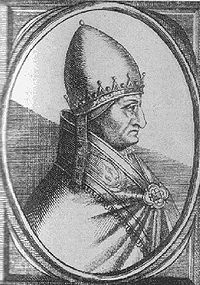- Ubi periculum
-
 Gregorio X, creador de Ubi periculum.
Gregorio X, creador de Ubi periculum.
Ubi periculum (en latín: En caso de peligro) es un documento promulgado por el Papa Gregorio X en el Concilio de Lyon en 1274 que estableció el cónclave papal como el método de selección de un Papa. En Ubi periculum se formalizó la táctica que había sido adoptada por los magistrados de Viterbo en contra de los cardenales durante la prolongada elección papal de 1268-1271.
Los historiadores han sugerido que el estado de anterior de no-cardenal de Gregorio X le llevó a adoptar una política en la no se destacan los intereses del Colegio de Cardenales.[1] El objetivo de Ubi periculum era limitar las maniobras estratégicas dentro de las elecciones para producir resultados más rápidamente, reduciendo así el número de cismas y elecciones disputadas.[1]
Ubi periculum también copia los procedimientos de la elección de la Constitución Dominicana de 1228, así como de los municipios de Venecia (1229) y Piacenza (1233).[1]
Las nuevas normas electorales han limitado a cada cardenal dos sirvientes, se les impidió salir o comunicarse con el mundo exterior, y restringió el menú de forma progresiva en los días cuarto y noveno, estas reglas fueron con frecuencia dejadas de lado y, a veces suprimidas por completo en los cónclaves que siguieron durante los siguientes siglos.[1]
Aunque la primera elección después de Ubi periculum observa sus reglas y en sólo un día se eligió Papa, su aplicación fue suspendida y en las elecciones de 1277, 1280-81, 1287-88 y 1292-94 fueron largas y prolongadas debido a ello. El Papa Celestino V (otro no-cardenal) restableció la ley del cónclave.[1]
Referencias
Enlaces externos
- Este artículo fue creado a partir de la traducción del artículo Ubi periculum de la Wikipedia en inglés, bajo licencia Creative Commons Atribución Compartir Igual 3.0 y GFDL.
Categorías:- Bulas
- Historia de la Iglesia católica
- Cónclaves
Wikimedia foundation. 2010.
